风萧萧_Frank
以文会友1...尚达曼:新加坡选出一位本可以更出色的总统
2...新加坡人在罕见的政治丑闻后投票选出礼仪总统
3...新加坡:城邦遭遇罕见的政治丑闻
尚达曼:新加坡选出一位本可以更出色的总统
https://www.bbc.com/news/world-asia-66643667
作者:Tessa Wong,亚洲数字记者,BBC 新闻,2023 年 9 月 1 日
Getty Images 总统候选人尚达曼(左)和他的妻子 Jane Ittogi 于 2023 年 8 月 22 日抵达新加坡总统选举提名中心时挥手致意。尚达曼先生与他的妻子 Jane Ittogi 一起出现在这里,他一直是明显的领跑者。
新加坡人选择尚达曼作为他们的下一任总统——但许多人在这样做时会发出一丝失望的叹息。
周五,这位前总理以创纪录的 70.4% 的得票率轻松击败了另外两名候选人,这是该国十多年来首次有争议的总统选举。
尚达曼先生一直是明显的领先者。他温文尔雅、谈吐流利、聪明睿智,深受新加坡人的尊敬,并一直被民意调查为岛上最受欢迎的政治家之一。
这就是为什么当尚达曼先生几个月前宣布退出执政的人民行动党 (PAP) 竞选总统时,许多新加坡人感到困惑,他们认为这是在浪费他的潜力。
总统的角色主要是礼仪性的,除了对新加坡庞大的财政储备的使用有一定的发言权外,几乎没有什么权力。它在公共事务上的发言权就更少了——有权罢免总统的政府已经明确表示,总统不能说话太随意,并将这一角色比作英国君主。
许多人认为,这是一个名义上的领袖角色,适合一个和蔼可亲、不具争议性的人担任,就像过去的总统一样。但尚达曼先生远不止于此。
除了担任财政部长和副总理,帮助领导新加坡的政治领导层外,这位前经济学家还担任过联合国和国际货币基金组织 (IMF) 等全球机构的高级理事会职务。有一段时间,他甚至被提名担任国际货币基金组织的负责人。
一些新加坡人认为,如果他离开人民行动党,他将继续在国际舞台上崭露头角。
甚至更多的人希望他能成为总理。几年前的一项调查显示,他是现任总理李显龙下台后成为总理的首选。在大选中,尚达曼先生的选区通常得分最高,仅次于李先生的选区。
这种受欢迎程度的部分原因在于,作为一名长期的副手,尚达曼先生的声誉一直受到保护,没有像李先生那样遭受公众批评的攻击。
但这位 66 岁的老人也树立了绅士形象,不像其他一些政客那样进行人身攻击。这让喜欢温文尔雅、有政治家风度的领导人的选民很满意。
许多人认为,尚达曼有能力和地位成为新加坡第一位非华裔总理,打破政府长期以来坚称是不可逾越的玻璃天花板。
人民行动党领导人以种族现实政治而闻名,他们经常重申,新加坡是一个华人占多数的国家,还没有准备好接受少数族裔总理。
尚达曼先生对这个话题保持沉默,直到上周他说,他认为新加坡已经准备好了,这加剧了他的支持者的失望情绪。
但尚达曼先生也坚称自己不适合当总理,而且随着人民行动党的新领导层在等待上台,可以说他已经走投无路了。一种理论认为,人民行动党希望他竞选总统,以帮助培养下一代领导人。
因此,他选择竞选总统。尽管新加坡过去曾有过非华裔总统,但尚达曼先生是第一位由公众投票选出的总统。
他的支持者可以声称他的胜利是代表权的胜利和对种族主义的否定。在选举前夕,一些社交媒体帖子坚持认为新加坡必须有华裔领导人。尚达曼先生的两位竞争对手都是华裔。
Getty Images 总统候选人黄国松(中)抵达新加坡投票站投票黄国松以约 16% 的得票率位居尚达曼先生之后,排名第二
具有讽刺意味的是,他还驳斥了人民行动党一项关键种族政策的论点。
在 2017 年总统大选之前,政府通过法律,确保某些选举仅限于少数族裔候选人。他们认为,制定这些规则是为了确保新加坡的少数族裔(包括马来人、印度人和欧亚混血人)有更好的代表性。
这些规则这次并不适用,因此尚达曼先生已经证明,少数族裔候选人可以凭借自己的力量获胜——而且是绝对的胜利。
因此,他的
政策研究所种族问题首席研究员马修·马修斯 (Mathew Mathews) 表示,尚达曼的胜利“无疑是新加坡种族关系的胜利”。
但他补充说,选举结果“并不一定意味着新加坡社会对种族问题视而不见”,因为在更公平的竞争中,种族问题可能是一个更大的因素。其他候选人的履历不如尚达曼出色,或者不那么出名。
影响力问题
与新加坡的任何选举一样,这次选举在一定程度上被视为对人民行动党的全民公投,该党最近遭遇了罕见的政治丑闻。
虽然尚达曼的压倒性胜利很大程度上可以归因于他个人的受欢迎程度,他的受欢迎程度一直高于人民行动党,但这也“表明该党的品牌并没有那么有害,不会让人因为与之联系而受到拖累”,南洋理工大学社会科学助理教授 Walid Jumblatt Abdullah 指出。
不过,这场胜利也被有关人民行动党影响力的问题所掩盖。人们普遍认为尚达曼先生是政府支持的候选人。
尽管他坚称自己将独立行事,但很少有人相信,对于一个一直是人民行动党最忠诚的团队成员之一的人来说,这是真的。
这次选举也再次引发了人们对其不透明和限制性标准的不满。一位潜在的热门候选人乔治·吴被取消了资格,而一位更具争议性的候选人陈钦亮被允许参选,他曾被指控性别歧视和种族歧视。
这与 2017 年大选如出一辙,当时政府对规则的改变引发了愤怒和争议。
尚达曼先生的胜利可能因此加深了人们对总统竞选日益受到政府操纵的看法。
甚至有一场运动敦促新加坡人以投票作废来抗议,尽管最终这一比例约为通常的平均水平 2%,这表明“绝大多数人认为这次选举值得参与,而且合法”,阿卜杜拉博士说。
尚不确定尚曼先生将如何在被视为延续人民行动党权力的体制下实现这一承诺,尚不清楚尚曼先生几十年来一直在帮助塑造这一体制。尚不确定尚不清楚尚曼先生在竞选中将如何实现这一承诺。尚不清楚 ...本文已更新,以反映以下内容:“对此,新加坡政府表示,竞选总统所需的资格并非‘不透明’。政府补充说,这些标准在宪法中有明确规定,其‘总统选举委员会向符合条件的申请人颁发资格证书’。”它还强调,新加坡的选举并非“被操纵”,因为“法律下的透明框架长期以来确保了该国选举自由公正地进行”。
2... 新加坡人在罕见的政治丑闻后投票选举仪式总统
https://www.bbc.com/news/world-asia-41237318?
作者:Frances Mao & Tessa Wong,BBC 新闻,新加坡 2023 年 8 月 31 日
EPA 公民在新加坡总统选举投票站登记投票公民在新加坡总统选举投票站登记投票
新加坡人已经前往投票站投票,这是他们多年来第一次有争议的总统选举十年来,新加坡的总统选举已经持续了十年。
总统在这个城市国家主要扮演礼仪角色,权力不大,在公共事务上几乎没有发言权。
但周五的结果可能成为公众对长期执政的人民行动党 (PAP) 情绪的一个标志,此前该党议员爆出一系列丑闻。
领先的候选人尚达曼曾是新加坡人民行动党的资深部长。
这位 66 岁的经济学家曾担任副总理和财政部长,于 6 月辞去人民行动党职务,参加总统选举。
李显龙总理领导的人民行动党在 2020 年遭遇了最糟糕的选举表现之一,尽管它仍然在议会中保留了三分之二以上的多数席位。
今年,该党的声誉因一系列罕见的政治丑闻而受损,包括一名高级部长在腐败调查中被捕,以及两名议员因婚外情辞职。
投票站的选民周五告诉 BBC,这可能会影响他们的投票。
“我认为在这次选举中,一些选民表达了他们对人民行动党的看法,一些选民则投票给他们想要的人。我想,胜负是 50-50,”女商人 Tong 告诉 BBC。
“但至少这一次,人们更加清楚总统能做什么,不能做什么。”
总统是新加坡大量财政储备的保管人,因此新加坡要求候选人具有公务员或企业经验。
尚穆加拉特南在选举中处于领先地位,这是十多年来首位有竞选的总统——即将卸任的总统哈莉玛·雅各布拒绝竞选第二个六年任期。
其他候选人包括 75 岁的前保险业高管陈钦亮
曾因在社交媒体上发布有关女性和印度人的帖子而受到批评的尚穆根,以及前财富基金投资官黄国松。
候选人的种族也是新加坡这个多元文化但华人占多数的城市国家的问题之一——有人强调尚穆根可能成为第一位由选民选出的非华裔总统。
然而,一名选民周五告诉 BBC,种族并不是一个因素。
“我一直认为,关键在于成为最佳候选人,而不是种族,”数字顾问安东尼说。
“我认为,在种族问题上,我们比其他国家好得多。我不会说我们已经完全摆脱了种族问题,但我们有能力随着时间的推移摆脱它。”
选民们也对谁可以竞选总统的严格限制感到震惊。
他们必须担任高级公务员或价值至少 5 亿新加坡元(2.92 亿英镑;3.7 亿美元)的上市公司的首席执行官。
新加坡 270 万符合条件的公民必须投票。
3... 新加坡:城邦遭遇罕见的政治丑闻
https://www.bbc.com/news/world-asia-66230766?
作者:Kelly Ng,BBC 新闻,新加坡 2023 年 7 月 19 日
路透社 李显龙新加坡一系列政治丑闻让人怀疑总理李显龙何时可以移交领导权
以政治稳定而闻名的新加坡遭遇了一系列罕见的政治丑闻。
上周,一名高级部长在腐败调查中被捕,这是四十年来首次卷入此类调查。
周一,两名议员辞职,其中一人曾被认为是潜在的总理,此前他们被曝出有婚外情。
此事震惊了新加坡的居民,新加坡素以廉洁治理而自豪,其领导人的薪酬位居世界最高。
分析人士表示,不断曝光的丑闻可能会削弱执政党人民行动党 (PAP) 的支持率,该党自 1959 年以来一直执政,在议会中占多数席位。
他们还表示,此事让人怀疑总理李显龙何时能交出领导权。
路透社 陈川仁和程丽惠陈川仁和程丽惠因“不正当关系”辞职
周一,国会议长陈川仁(54 岁)和同为议员的程丽惠(47 岁)因“不正当关系”辞职,退出党和立法机构。陈先生已婚,程女士单身。
上周,新加坡反腐监督机构逮捕了交通部长 S Iswaran 和亿万富翁酒店老板王明成,这引发了更多有关透明度的质疑。这两名男子在 2008 年将大奖赛带到新加坡的过程中发挥了关键作用。
上周三,新加坡人被告知,在调查期间,易华仁先生已被要求停止部长职务。
副总理黄循财告诉当地媒体,腐败调查将“全面、彻底和独立”,不会掩盖任何事实。
但当局在逮捕行动实际发生三天后才宣布逮捕。两人均未受到指控,目前已保释。
逮捕是在另外两名高级部长被指控以低于市场价格的价格在高档社区租下殖民时代的平房之后进行的。
虽然反腐败审查宣告 K Shanmugam 和 Vivian Balakrishnan 这两名男子无罪,但此事引发了一场关于新加坡不平等和政治观点的激烈辩论。
这一系列不同寻常的事件已经买下了不可避免的模因。 “新加坡这一季的编剧们真的超越了自己,”Instagram 页面 yeolo.sg 的创建者周一写道。
另一篇帖子展示了芭比电影片场的女演员们围坐在笔记本电脑前,帖子写道:“当我和女孩们突然对新加坡政治感兴趣时。”
另一位 Instagram 用户讽刺地将当前的政治局势比作洒茶或分享八卦。
但玩笑背后隐藏着一个严肃的问题,即人民行动党的未来以及它能赢得新加坡人多久的信任。
它在最近经历了类似的丑闻——在过去十年中,一位前国会议长和一位后座议员因婚外情而下台。但丑闻和腐败调查的时间很近,这加剧了选民的审查。
长期以来,人民行动党一直以要求立法者遵守高道德标准和保持内部秩序的能力而自豪。它的一位创始成员曾将加入人民行动党比作加入神职人员。
李先生本周为人民行动党处理近期丑闻的方式辩护,称这体现了“制度如何运作”。
“有时事情会聚在一起,但我们确保纠正它们,”他说,并补充说“高标准的礼仪和个人行为……是新加坡人信任和尊重人民行动党的根本原因”。
但其他
观察人士认为,这些争议使人们对新加坡——尤其是人民行动党——声称的卓越治理产生了怀疑。
“我认为最大的问题围绕着权力限制、监督、透明度、议会程序的公正性,以及人民行动党声称的对自身的充分制约,”驻新加坡的政治学家 Ian Chong 表示。
他指出,人民行动党拒绝了其他发达司法管辖区常见的政治做法,例如公职人员、高级公务员及其直系亲属公开收入和资产。
澳大利亚国际关系教授 Michael Barr 曾撰写过多本关于新加坡政治的书,他补充说,新加坡没有强有力的机制来追究有权势的人的责任。
“你必须信任他们。这就是为什么这对政府来说是一系列如此危险和新颖的发展。他们正在破坏公众信任的宝库,”他说。
在透明国际最新的腐败感知指数中,新加坡被列为第五个最不腐败的国家。多年来,政府一直以七位数的部长薪资作为镇压腐败活动的一种方式。
但巴尔博士指出:“如果没有极高的公众信任度,政府必须依靠两件事之一来赢得选举:要么镇压和其他颠覆民主的措施,要么依靠高水平的绩效合法性。他们近年来的记录让我们可以忘记绩效合法性。”
最近发生的事件也使人们对李先生何时卸任产生了疑问。
这位 71 岁的总理自 2004 年以来一直担任总理,他经常谈到他希望退休。继任者已经确定:兼任财政部长的黄循财。
但周一,李先生表示,他没有计划立即举行大选。下一次选举将于 2025 年 11 月举行。
张博士指出,黄循才在处理最近的丑闻时并没有更加积极和引人注目,这也引发了人们对他及其同僚是否准备好接任新加坡领导人的质疑。
1...Tharman Shanmugaratnam: Singapore picks a president who could've been much more
2... Singaporeans vote for ceremonial president after rare political scandals
3... Singapore: City-state rocked by rare political scandals
Tharman Shanmugaratnam: Singapore picks a president who could've been much more
https://www.bbc.com/news/world-asia-66643667
By Tessa Wong, Asia Digital Reporter, BBC News, 1 September 2023
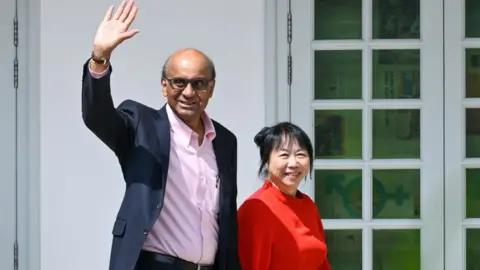 Mr Tharman, seen here with his wife Jane Ittogi, was always the clear frontrunner
Mr Tharman, seen here with his wife Jane Ittogi, was always the clear frontrunnerSingaporeans have chosen Tharman Shanmugaratnam as their next president - but many would have let out a small sigh of disappointment as they did so.
On Friday, the former top minister won a record 70.4% of the votes, comfortably beating two other candidates in the country's first contested presidential election in more than a decade.
Mr Tharman was always the clear frontrunner. Urbane, well-spoken and intelligent, he is highly regarded by Singaporeans and consistently polls as one of the island's most popular politicians.
Which was why, when Mr Tharman announced several months ago he was quitting the ruling People's Action Party (PAP) to run for president, many Singaporeans were baffled by what they viewed as a waste of his potential.
The role of president is a largely ceremonial one that holds little power, apart from having some say on the use of Singapore's sizeable financial reserves. It has even less say in public affairs - the government, which has the power to remove the president, has made it clear the president cannot speak too freely and has likened the role to the British monarch.
It is a figurehead role that many see suitable for a pleasant, uncontroversial person to inhabit, as has been the case with past presidents. But Mr Tharman is much more than that.
Besides helping to helm Singapore's political leadership as finance minister and deputy prime minister, the former economist has also held top council positions at global institutions such as the United Nations and the International Monetary Fund (IMF). At one point, he was even tipped to head the IMF.
Some Singaporeans thought that if he ever left the PAP, he would go on to make his mark in the international arena.
Even more hoped he could be prime minister. A survey some years ago saw him poll as the first choice to become PM after incumbent Lee Hsien Loong steps down. In general elections, Mr Tharman's constituency often scores the highest after Mr Lee's.
Part of this popularity stems from the fact that as a long-time deputy, Mr Tharman's reputation has been shielded from the slings and arrows of public criticism which Mr Lee has had to bear.
But the 66-year-old has also cultivated a gentlemanly image, and has refrained from engaging in personal attacks unlike some other politicians. This has played well with an electorate that likes its leaders genteel and statesmanlike.
Many felt he had the chops and stature to become that almost mythical creature - the first non-Chinese prime minister of Singapore - and break a glass ceiling that the government has long insisted is concrete.
Famous for their racial realpolitik, PAP leaders often reiterate that Singapore, a Chinese-majority country, is not ready to accept a minority PM.
Mr Tharman kept mum on this topic until last week when he said he felt Singapore was ready, sharpening the sting of disappointment among his supporters.
But Mr Tharman has also insisted he would not be good at being PM, and with the PAP's new leadership waiting in the wings, it could be said he was already on his way out. One theory is the PAP wanted him to run for president to help shepherd the next generation of leaders.
And so, he chose to run for president instead. Although Singapore has had non-Chinese presidents in the past, Mr Tharman is the first one voted in by the public.
His supporters could claim his victory as a win for representation and a repudiation of racism. In the lead-up to the election, some social media posts insisted that Singapore must have Chinese leaders. Mr Tharman's two competitors were both Chinese.
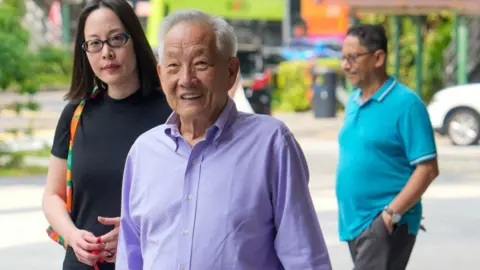 Ng Kok Song came in second behind Mr Tharman, with about 16% of the vote
Ng Kok Song came in second behind Mr Tharman, with about 16% of the vote
Ironically he has also blown apart the argument for a key PAP racial policy.
Prior to the presidential election in 2017, the government passed laws ensuring some polls would be restricted to minority race candidates. They argued the rules were needed to ensure better representation of minorities in Singapore, which include Malays, Indians, and Eurasians.
Those rules did not apply this time, so Mr Tharman has proven that a minority race candidate can win under their own steam - and resoundingly so.
For this reason, his victory "is certainly a win for race relations" in Singapore, said Mathew Mathews, a principal research fellow specialising in race at the Institute of Policy Studies.
But he added that the results "don't necessarily mean that Singapore society is race-blind", as race would likely be a bigger factor in a more even competition. The other candidates had CVs less distinguished than Mr Tharman's, or were less known.
Questions of influence
As with any election in Singapore, this one was seen partly as a referendum on the PAP, which has suffered rare political scandals recently.
Though Mr Tharman's landslide win can be largely attributed to his personal popularity which has always outstripped the PAP's, it also "shows that the party brand is not so toxic such that the association with it drags a person down", noted Walid Jumblatt Abdullah, an assistant professor in social sciences at Nanyang Technological University.
Still, the victory has also been overshadowed by questions about the PAP's influence. Mr Tharman was widely seen as the government-backed candidate.
Though he has insisted he will act independently, few believe this to be true of a man who has been one of the PAP's most loyal team players.
This election also saw renewed disgruntlement over its opaque and restrictive criteria. A potentially popular candidate, George Goh, was disqualified while a more controversial one, Tan Kin Lian, who had been accused of sexism and racism, was let in.
It echoed the 2017 election where the government's changes to the rules provoked anger and controversy.
Mr Tharman's win may have thus deepened the perception that the presidential race is increasingly rigged by the government.
There was even a movement urging Singaporeans to spoil their ballots in protest, though in the end that percentage was around the usual average of 2%, which showed "the overwhelming majority viewed this election worth partaking in and legitimate", Dr Abdullah said.
Mr Tharman ran on a campaign promising "respect for all", including "respect for different views and political leanings".
But it is not certain how he would achieve that as president in a system perceived as perpetuating the PAP's power - a system he helped to shape for decades.
This article has been updated to reflect the following: "In response, the Singapore government said that the qualifications required to run for President are not "opaque". The government added the criteria are spelt out in the Constitution and that its "Presidential Elections Committee issues a certificate of eligibility to applicants who meet the criteria." It also stressed that elections in Singapore are not "rigged" as a "transparent framework under the law has long ensured that elections are conducted freely and fairly in the country".
2... Singaporeans vote for ceremonial president after rare political scandals
https://www.bbc.com/news/world-asia-41237318?
By Frances Mao & Tessa Wong, BBC News, Singapore 31 August 2023
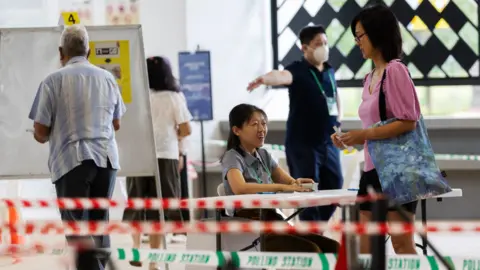 Citizens register to vote at a polling station for the presidential election in Singapore
Citizens register to vote at a polling station for the presidential election in SingaporeSingaporeans have headed to the polls to vote in their first contested presidential election in over a decade.
The president has a mainly ceremonial role in the city-state with few powers and little say in public affairs.
But the result on Friday could be a marker of public sentiment on the long-term ruling People's Action Party (PAP) following a string of MP scandals.
Leading candidate Tharman Shanmugaratnam was a veteran minister of Singapore's PAP.
A former deputy prime minister and finance minister, the 66-year-old economist resigned from the People's Action Party in June to contest the presidential election.
Prime Minister Lee Hsien Loong heads the PAP, which suffered one of its worst electoral showings in 2020 although it still retained more than a two-thirds majority in parliament.
This year the party's reputation has been damaged by a string of rare political scandals including a senior minister's arrest in a corruption probe, as well as two lawmakers' resignations over an extramarital affair.
Voters at polling stations told the BBC on Friday this could influence their vote.
"I think at this election some voters are expressing how they feel about the PAP and some are voting for who they want. It's 50-50 i would say," businesswoman Ms Tong told the BBC.
"But at least this time round people are more aware now of what the president can or cannot do."
The president acts as the custodian of the city's substantial financial reserves so Singapore requires its candidates to have either civil service or corporate experience.
Mr Shanmugaratnam is the frontrunner in the vote, the first to be contested in more than a decade - after outgoing President Halimah Yacob declined to contest a second six-year term.
The other candidates include Tan Kin Lian, a 75-year-old former insurance executive who has been criticised for social media posts he made in the past about women and Indians, and Ng Kok Song, a former wealth fund investment officer.
The candidates' ethnicities in the multicultural but majority-Chinese city-state has been one of the issues too - with some highlighting Mr Shanmugaratnam may become the first non-Chinese president to be elected by voters.
However a voter told the BBC on Friday race was not a factor.
"I always saw it about being the best candidate and not about race," said digital consultant Mr Anthony.
"I think we are far better off than other countries when it comes to race. I won't say we are past race entirely, but we have what it takes to move past it in time."
There has also been consternation among voters about the stringent restrictions on who can run for president.
They must have either served as a senior civil servant or the chief executive of a public company worth at least $500m Singaporean dollars (£292m; $370m).
Voting is compulsory for Singapore's 2.7 million eligible citizens.
3... Singapore: City-state rocked by rare political scandals
https://www.bbc.com/news/world-asia-66230766?
By Kelly Ng, BBC News, Singapore 19 July 2023
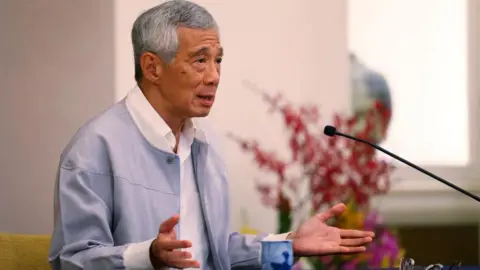 A string of political scandals in Singapore casts doubt on when Prime Minister Lee Hsien Loong can hand over the leadership reins
A string of political scandals in Singapore casts doubt on when Prime Minister Lee Hsien Loong can hand over the leadership reins
Singapore, known for its political stability, has been rocked by a string of rare political scandals.
Last week, a senior minister was arrested in a corruption probe, the first in four decades to be implicated in such an investigation.
And on Monday, two lawmakers - one of them once tipped as a potential prime minister - resigned after it was revealed they were in an extramarital affair.
It has shocked residents of the city-state, which prides itself on its reputation for clean governance and has the highest paid leaders in the world.
Analysts say the unfolding scandals could dent support for the ruling People's Action Party (PAP), which has been in power since 1959 and holds a large majority in parliament.
They also say it casts doubt over when Prime Minister Lee Hsien Loong can hand over the reins of leadership.
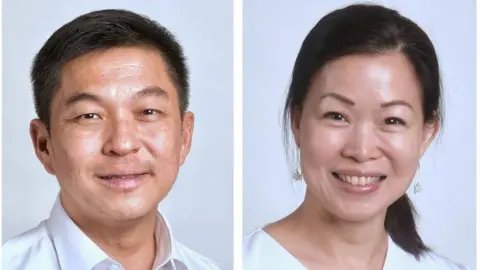 Tan Chuan-jin and Cheng Li Hui resigned over their "inappropriate relationship"
Tan Chuan-jin and Cheng Li Hui resigned over their "inappropriate relationship"
On Monday, Speaker of Parliament Tan Chuan-jin, 54, and fellow lawmaker Cheng Li Hui, 47, resigned from the party and the legislature over their "inappropriate relationship". Mr Tan is married, while Ms Cheng is single.
More questions on transparency arose last week, when Singapore's anti-corruption watchdog arrested Transport Minister S Iswaran and billionaire hotelier Ong Beng Seng. The two men played key roles in bringing the Grand Prix to Singapore in 2008.
Singaporeans were told last Wednesday that Mr Iswaran had been asked to take leave from his ministerial duties amid a probe.
Deputy prime minister Lawrence Wong has told local media the corruption probe would be "full, thorough and independent", and that nothing will be swept under the carpet.
But authorities only announced the arrests three days after they actually took place. Both men have not been charged and are currently out on bail.
The arrests came on the heels of allegations that two other senior ministers had rented colonial-era bungalows in a high-end neighbourhood at below-market rates.
While an anti-graft review cleared the two men, K Shanmugam and Vivian Balakrishnan, of wrongdoing, the matter sparked a heated debate on inequality in Singapore and political optics.
The unusual series of events has bought out the inevitable memes. "The writers of this season of Singapore have really outdone themselves," wrote the creators behind Instagram page yeolo.sg on Monday.
A separate post, featuring actresses on the set of the Barbie movie crowding around a laptop, read: "When me and the girlies are suddenly interested in sg politics."
Another Instagram user wryly compared the current political situation to spilling tea, or sharing gossip.
But beyond the jokes lie serious questions about the future of the PAP and how long it can hold on to Singaporeans' trust.
It has weathered similar scandals in the recent past - in the last decade a previous parliamentary Speaker and a backbencher stepped down because of extramarital affairs. But the close timing of the scandals and corruption probe has heightened voters' scrutiny.
The PAP has long prided itself on demanding high moral standards of its lawmakers, and its ability to keep its house in order. One of its founding members once compared joining the PAP to joining the priesthood.
Mr Lee this week defended his party's handling of the recent scandals, saying it demonstrated "how the system has to function".
"Sometimes things cluster up, but we make sure we put them right," he said, adding that "high standards of propriety and personal conduct… are the fundamental reasons Singaporeans trust and respect the PAP".
But other observers contend these controversies call into question Singapore's - and in particular, the PAP's - claims to exceptional governance.
"I think the biggest questions surround restraints on authority, oversight, transparency, the impartiality of parliamentary process as well as the PAP's claim that it is a sufficient check on itself," said Singapore-based political scientist Ian Chong.
He noted that the PAP has rejected political practices common in other developed jurisdictions, such as public disclosure of income and assets by political office holders, senior civil servants and their immediate family members.
There are no robust mechanisms for holding powerful people to account, added Michael Barr, an Australia-based international relations professor who has written several books on Singapore politics.
"You just have to trust them. That is why this is such a dangerous and novel set of developments for the government. They are trashing their repositories of public trust," he said.
Singapore is ranked the fifth-least corrupt country in Transparency International's latest Corruption Perceptions Index. Over the years, the government has justified seven-figure ministerial pay checks as a way to repress corrupt activity.
But Dr Barr pointed out: "Without extraordinary levels of public trust, the government must rely on one of two things to win elections: either repression and other measures that subvert democracy, or a high level of performance-based legitimacy. Their record in recent years is such that we can forget about performance legitimacy."
The recent events also cast doubt on when Mr Lee would step down.
The 71-year old, who has been prime minister since 2004, has often spoken of his wish to retire. A successor has already been designated: Lawrence Wong, who is also finance minister.
But on Monday, Mr Lee said he has no plans to call for an immediate general election. The next polls are due by November 2025.
The fact that Mr Wong has not been more active and visible in addressing the recent scandals also raises questions about him and his peers' readiness to take over as the city-state's leaders, noted Dr Chong.




